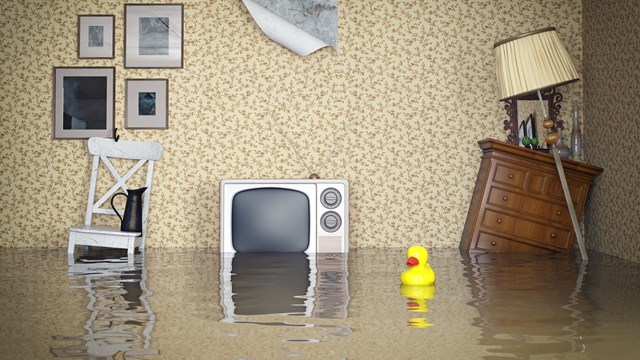While environmental laws have improved air quality, grit, grime and grunge continue to mask the windows of most New Yorkers. This aesthetic blur can change a tenant's disposition as well as alter how a building is perceived by a passerby's knowing glance.
However, getting a handle of when and how to properly clean your building's windows is a science - one that should be left to skillful hands, namely trained professionals. "The building looks more attractive and the desire to live in the building increases," says Brent Weingard, owner of the Manhattan-based Expert Window Cleaners. "It makes a big difference and should be done regularly."
The Grit on Grime
Regardless of "green" laws, and with automobiles and construction in non-stop motion, the windows of the city take an atmospheric beating. If neglected for too long, a building can become a dull shadow of itself, creating an abandoned warehouse appearance. But what exactly are the causes?
Wayne Bellet, owner of Manhattan's Bellet Construction Co. Inc, agrees with the aforementioned perpetrators of grime, but also cites construction - namely masonry - as a major catalyst for dirty windows. "It's automotive and truck fumes, microscopic dirt particles, and debris, but with masonry there is dust flying everywhere, and it gets on your clothes, your body and the buildings," Bellet notes. "It gets everywhere."
Weingard explains that the location of a building, and what surrounds it, plays a major role in the amount of dirt damage. "The front of the building will get dirtier than the back," he says. "And if there are oil burners venting off roofs, like chimney smoke, it can create black sooty dirt, which is also a problem for those who have greenhouses."
Another component of "dirty" windows are the chalky, filmy stains that never seem to leave. Oddly enough, these are called water or mineral stains. In theory, water should keep a window somewhat clean, but when mixed with chemical agents like concrete and metal particles, serious damage can occur to window glass. "New construction, exposed concrete, and metal can cause mineral stains, which requires an additional process [to clean]," says Weingard.
When and How Much
Before elaborating on those "additional processes," which obviously means more money, it is important to understand what time of year is optimum to have window-cleaning work completed. While industry professionals suggest cleaning all windows two or three times per year, most jobs are done once a year, and usually in the spring. "It should be done twice year; in the spring, and in the fall," says Peter Grech, president of the Manhattan-based Superintendents Technical Association, formerly the Supers Club.
Since appearances are of paramount concern for tenants and building owners, the first few floors and lobby area should receive additional attention. "The first, second and third floors should be done more often, because it keeps up curb appeal," adds Grech.
Not unlike going to the dentist - which nobody enjoys, but whose benefits are highlighted by an improved self-image, Weingard suggests a four month cleaning schedule. "Often windows are neglected and people don't get enough enjoyment because the windows are filthy," he says. "I recommend it three times a year because it's an inexpensive way to improve appearances and get more natural light, which is important in the winter," he notes, adding that an average high-rise building takes two to three days to clean fully.
And like a visit to the dentist, a professional cleaning can be pricey. The average cost per pane, which is the industry's measuring stick, can run between $8 and $20. Provided that it is a single paned window, however - segmented windows run higher. Double-hung or multi-panel windows increase the price. In addition, the amount of labor required - such as "chair drops" which is the industry lingo for one or two workers scaffolding and traversing a building's exterior - makes estimating a job more difficult and ultimately more expensive. "It's tricky and hard to give an estimate, but we charge by the window and give discounts on larger scale jobs," says Weingard, adding that free estimates are common among cleaning firms.
When tackling windows that have sustained mineral damage, the price of cleaning is on average three times more expensive and requires more intense cleaning agents. However, windows that have the tendency of sustaining mineral damage can be cleaned with a product that seals the window against these elements. This practice, Weingard explains, should be done every six months.
And while most companies can do last minute jobs, they usually require at least three weeks notice, sometimes longer depending on the size and scope of the building. "If you call up and yell, we'll get over there and do it the next day if possible," says Bellet. "But give us more notice."
Joy to the World?
Environmental laws have resulted in earth-friendly cleaning products, some of which are used in window cleaning. However, some professionals prefer the classics. "The products haven't really changed," says Weingard. "We like a low-suds, environmentally-friendly product. I happen to like Joy dishwashing liquid - it does a great job." Bellet adds, "Personally, I like soap and water, and there are a number of other products, but none of which I want to endorse."
Endorsements aside, there are a plethora of products used to achieve satisfaction, mostly generic, all-purpose cleaning agents. But just because spring and fall are the suggested seasons for this service, it doesn't stop winter cleanings - even with the brutality January offered this year, explains Weingard. "Winter doesn't stop us. We use windshield detergent that only freezes at below 20 degrees, and we keep our hands warm with arctic diving gloves. We'll work through just about anything except high winds."
Many new buildings have windows that open from the inside, which has made window cleaning slightly easier, as well as altering costs as insurance rates drop due to the work being completed from the inside. "Most modern windows fold inwards," says Grech. "Seventy percent of the buildings have had windows replaced or upgraded. It just makes it easier."
Part of making window-cleaning easier and ultimately safer, however, is tenants making the necessary preparations by clearing all their personal items from in and around their windows before the crews arrive and begin work. "The biggest problem we have when doing a building is having all the people ready to cooperate with us," says Weingard. "We're professionals and don't need babysitters," he adds, with a laugh.
While squeegees and cloth chamois are used in most instances, many professionals use newspaper to create a streak-free appearance. But with many historical buildings lining city streets, a different approach is necessary when cleaning these aging giants.
"Historical buildings are terribly sensitive to runoff, and the management company should find an approved cleaner," says Bellet. A natural-based cleaning product is very important as many of the chemical agents found in cleaning products have negative impacts on window casings and sealants, which causes oxidization, internal moisture and mineral stains. "This is an important aspect because it can stunt the life expectancy of a window and lead to replacements," Bellet adds.
The façade of these buildings are often more detailed compared to newer buildings that have a "flatter" appearance. For buildings that house the original glass, a specialized approach is required. "With older glass you have to be gentle and you must take more care to protect the façade that surrounds the windows," says Weingard. Bellet explains that a proper cleaning of a façade, which should be done every five years, will ultimately prolong the life of a window.
Checks and Balances
A management company or homeowners association should do proper research when deciding on hiring a window washing company. Even if a building has a relationship with a certain company, industry professionals implore those responsible to take a hard look at a company's track record and make sure they are properly insured and certified.
"You would be amazed by how many companies deliberately misclassify themselves," says Bellet.
For example, insurance papers and licenses should be checked with city officials, because a company could be classified for certain types of home improvement but not licensed to clean the windows of a high-rise building. "This trend is extremely strong in this hard insurance market," says Bellet, "but it's like playing Russian roulette."
The New York City Department of Buildings requires "riggers" - the workers who assemble scaffolding - to take a oral exam, which tests their knowledge of rules and regulations governing hoisting and rigging, weights of various materials to be hoisted, knowledge of safety measures, accident prevention and related matters, as well as a candidates' ability to perform rigging operations. Candidates must attain a score of at least 70 percent in the practical-oral test to qualify for the license. Candidates are also required to demonstrate their ability to read and write English. In addition, they must also receive a certificate of physical fitness.
Upon completion of these requirements, each rigger is assigned a license number, which should be checked before a company is hired, explains Bellet. "Every rigger has a four digit number, which is easy to remember and can be checked with the building department."
The Virginia-based International Window Cleaners Association (IWCA), where Weingard serves on the board of directors, also encourages certification for safety, professionalism and as a way to lower insurance costs. Window cleaning professionals are typically covered by the insurance provided by the company they work for, and you should make sure the company has the proper certificate of insurance. "Safety is an important issue and one that we train for," says Weingard. "We hold monthly safety meetings, which helps with liability insurance and workman's compensation but most of the training is done on the job," he adds.
A visit to the IWCA website offers pertinent information that can be used when choosing a company. IWCA president Bob Zeolla, who owns the Foxboro, Mass.-based Sunset Cleaning Company, states, "Window cleaners, window cleaning companies and their customers will all benefit from worker certification. The knowledge that workers have been trained will instill confidence in business owners and customers alike."
Regardless of whether you opt to have your building's windows spritzed and squeegeed four times a year or only once, says Bellet, "This business is just like anything else - you have to shop around."
W.B. King is a freelance writer and a frequent contributor to The Cooperator.







Leave a Comment